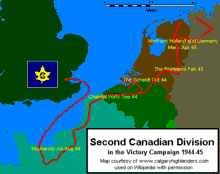4th Canadian Infantry Brigade
The 4th Canadian Infantry Brigade was an infantry brigade of the Canadian Army active during World War I and World War II. Raised in 1915, the brigade formed part of the 2nd Canadian Division and fought on the Western Front between 1916 and 1918. The brigade was re-raised in 1939 for service during World War II and subsequently took part in actions at Dieppe in 1942 and then in north-west Europe during 1944 and 1945.
| 4th Canadian Infantry Brigade | |
|---|---|
 2nd Canadian Infantry Division Formation Patch | |
| Active | 1915–1919 1939–1945 |
| Country | |
| Branch | |
| Type | Infantry |
| Size | Brigade |
| Part of | 2nd Canadian Division |
| Engagements | World War I |
History
World War I
The formation of the 2nd Canadian Division began in May 1915 in Britain following the arrival of a large contingent of soldiers from Canada. The 2nd Division remained in Great Britain only a short time before embarking for France in September 1915. Under the command of Major-General R.E.W. Turner, its members spent a long and bitterly cold winter in a Belgian section of the front between Ploegsteert Wood and Saint-Eloi, south of Ypres. The brigade's first major combat took place during the actions of St Eloi Craters in March – April 1916. Infantry units as well as artillery units of the 2nd Canadian Division served in both France and Flanders until Armistice Day. It was disbanded by May 1919.[1]
The 4th Brigade took part in the following battles:[2]
- 1916
- 1917
- 1918
World War II
It was mobilized on 1 September 1939 part of 2nd Canadian Infantry Division, even before the declaration of war, and the battalions were promptly fleshed out by volunteers. However, further expansion of the Brigade was hindered by a temporary halt in recruitment and uncertainty about overseas deployment. Consequently, the brigade headquarters were not actually formed until May and June 1940. The 2nd Division conducted Operation Jubilee, a large-scale raid on Dieppe, France in August 1942 with the 4th and 6th Canadian Infantry Brigades, suffering extensive losses in the landing and the ensuing withdrawal.[3]
Following reconstruction, the 4th Brigade, along with the rest of the 2nd Canadian Division, moved to Normandy in time to serve with the British 2nd Army. It then participated in the advance along the Channel coast with the Canadian 1st Army including the liberation of Dieppe. The division saw heavy action in the Netherlands in late 1944 and took part in the final offensives in 1945.
Organization
World War I
The 4th Canadian Brigade consisted of the following units during World War I:[1]
- 18th (Western Ontario) Battalion Canadian Infantry
- 19th (Central Ontario) Battalion Canadian Infantry
- 20th (Central Ontario) Battalion Canadian Infantry
- 21st (Eastern Ontario) Battalion Canadian Infantry
- 4th Canadian Machine Gun Company
- 4th Canadian Trench Mortar Battery
World War II

In 1939, the 2nd Division was organized along regional lines, like the 1st Canadian Infantry Division. The initial order of battle for the 4th Infantry Brigade was as follows:[4]
- The Royal Regiment of Canada – Toronto, Ontario
- The Royal Hamilton Light Infantry (Wentworth Regiment) – Hamilton, Ontario
- The Essex Scottish Regiment – Windsor, Ontario
- The Cameron Highlanders of Ottawa (Machine Gun) – Ottawa, Ontario
By 1944–45 the brigade consisted of:[4]
- 1st Battalion, The Royal Regiment of Canada
- 1st Battalion, The Royal Hamilton Light Infantry
- 1st Battalion, The Essex Scottish Regiment
- 4th Infantry Brigade Ground Defence Platoon (Lorne Scots)
Awards
Four members of the brigade received the Victoria Cross:
- Frederick Hobson of the 20th Battalion for actions on the Western Front in 1917.[5]
- Wallace Algie of the 20th Battalion for actions on the Western Front in 1918.[6]
- Rev. John Weir Foote, VC, CD (5 May 1904 – 2 May 1988 ), Regimental Chaplain to The Royal Hamilton Light Infantry (Wentworth Regiment) for work with the wounded at the Dieppe Raid.[7]
- Frederick Albert Tilston acting major in The Essex Scottish Regiment. During the Battle of the Rhineland, he volunteered to lead an infantry company in an attack on the Hochwald. After leading "C" Company in a 500-yard attack and wounded, he refused to be evacuated while he organized a defence against German counter-attacks.[8]
See also
References
- "2nd Canadian Division". The Long, Long Trail: The British Army in the Great War of 1914–1918. Retrieved 4 December 2016.
- "War Diaries of the First World War". Library and Archives Canada. Retrieved 8 January 2007.
- Robertson, Terence, The Shame and The Glory
- Stacey, C.P. The Canadian Army 1939–1945 (Queen's Printer, 1948)
- "Fredrick Hobson". Veterans Canada. Retrieved 7 December 2010.
- "Lieutenant Wallace Lloyd Algie – Veterans Affairs Canada". Vac-acc.gc.ca. Retrieved 5 May 2012.
- "Rev. John Weir Foote – Veterans Affairs Canada". Vac-acc.gc.ca. Archived from the original on 28 November 2007. Retrieved 23 January 2011.
- "Frederick Albert Tilston". National Defence and Canadian Forces. Retrieved 8 December 2010.
Further reading
- Nicholson, G.W.L (2015) [1962]. Canadian Expeditionary Force, 1914–1919: Official History of the Canadian Army in the First World War. Montreal: McGill-Queen's Press. ISBN 9780773597907.